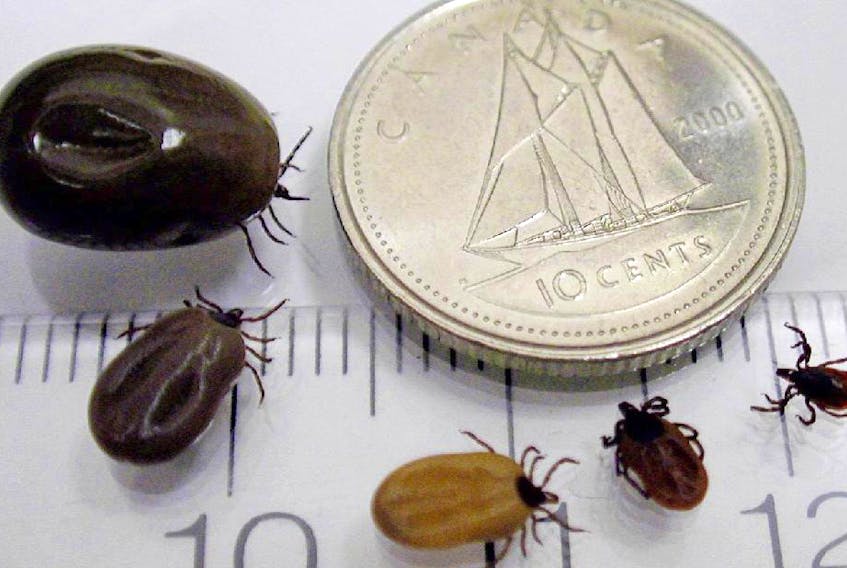SACKVILLE, N.B. — The federal U.S. public health agency has set an example for Canada to follow by acknowledging that Lyme disease could be passed from mother to fetus with serious consequences, says a Mount Allison University expert.
“The first step is acknowledging that the transmission happens,” said Vett Lloyd, a biologist and founding member of the university’s Lyme Disease Network. “The next step is getting enough information that physicians, family doctors, and families have the information they need to manage the risk.”
Centers for Disease Control and Prevention website was updated Jan. 27 to include mother to fetus as a possible way of transmitting the disease. The new section states, “Untreated Lyme disease during pregnancy can lead to infection of the placenta. Spread from mother to fetus is possible but rare.”
It’s a game-changer, said Lloyd. The world’s leading public health body has acknowledged decades of research showing that B. burgdoferi, the pathogen causing Lyme disease, can be transmitted in utero, and not just from tick to human.
Knowing there’s a transmission from mother to fetus there’s every reason to say, 'Look, this is a cause for concern.'”
Lloyd pointed to a comprehensive review of the available research published in November 2018. A CDC scientist and four others from the Public Health Agency of Canada authored the report that appeared in the peer-reviewed science journal PLOS One.
It looked at 59 cases of pregnant mothers carrying Lyme disease and their pregnancy outcomes, finding 36 of the 59 fetuses had been harmed. Complications ranged from miscarriage and stillbirth to congenital abnormalities, respiratory distress and heart abnormalities.
On Monday, The Chronicle Herald inquired with CDC for more information about their new stance on in utero transmission but did not get a response by end of day.
But for Lloyd, who’s a leading tick expert in Canada, the CDC’s change of heart backs up what she believed to be true for years.
“Why would you expect a newborn who is physically delicate and their immune system is not mature, to be more able to tolerate the infection than an adult?" said Lloyd. “Knowing there’s a transmission from mother to fetus there’s every reason to say, 'Look, this is a cause for concern.'”
While the CDC acknowledged human-to-human transmission it states that with appropriate antibiotic treatment, there is "no increased risk of adverse birth outcomes." The American public health agency also points to the absence of published studies “assessing developmental outcomes of children whose mothers acquired Lyme disease during pregnancy."
That points to the urgency for more research, said Lloyd. Establishing that a mother can pass Lyme on to her baby is just the tip of the iceberg. Getting a handle of how often in utero transmission happens is a good starting point, she said.
"But also does it matter when in pregnancy a mother’s infected? What’s the best way of treating the infection? What if she’s been infected with Lyme disease but other (tick-born) diseases as well? What difference does it make?”
The Herald inquired with Nova Scotia’s public health office about its response to CDC confirming maternal-fetal transmission. Dr. Robert Strang, the chief medical officer of health, was not available for an interview but the office said in an email that “we are working with the Public Health Agency of Canada to understand the CDC’s new publication.”
The Herald also contacted PHAC on Monday to comment on the CDC development but did not get a response.
The province follows the same Lyme Disease guidelines as PHAC, which states there is not enough evidence to confirm that Lyme disease during pregnancy has adverse effects for the fetus.
Eventually, Lloyd hopes PHAC and the province’s public health officials will follow suit with CDC. Sooner rather than later.
"CDC has a very significant international presence so there is usually a follow-the-leader effect. They now have to deal with person to person transmission so that adds a new dimension in terms of risk and messaging that may be scary," said Lloyd.
"However, that’s what the science says is happening. The reality doesn’t go away if you ignore it so it's very appropriate for public health agencies to acknowledge the science and tell people what the risks are."









